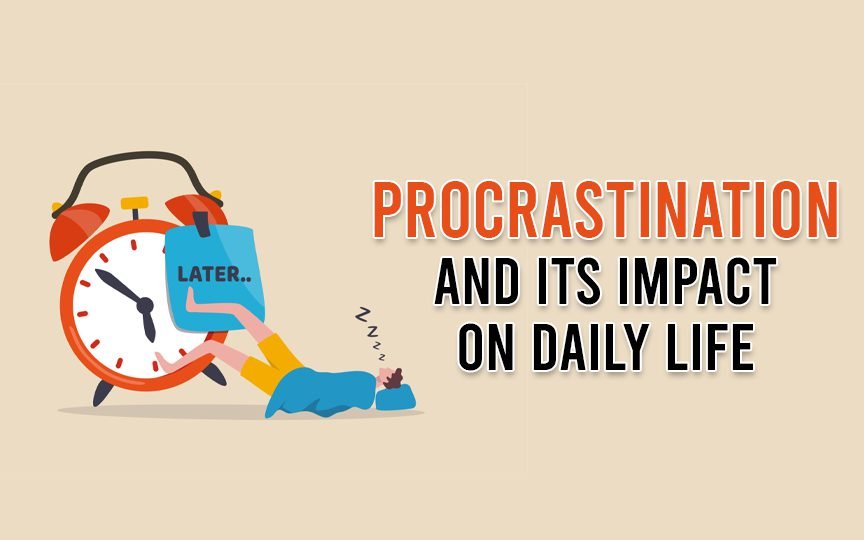Procrastination is a normal human tendency that affects many people’s lives. It is a time that is frequently muffled in anguish and self-pity. Fundamentally, procrastination is the act of postponing tasks and decisions, frequently out of a desire for quicker, less important tasks. While procrastination sometimes happens to everyone, when it turns into an addiction, it can have a devastating impact on our day-to-day activities.
We will talk about procrastination and how it impacts our day-to-day lives in this blog.
Defining Procrastination
The act of putting off chores, responsibilities, or decisions—particularly those that are important, urgent, or time-sensitive—is known as procrastination. This conduct usually involves choosing to do something else rather than what needs to be done, which commonly results in last-minute rushes and increased pressure. It can manifest itself in a variety of different ways, such as endlessly scrolling on social media or changing your to-do list.
The Impact on Our Lives
1. Enhanced Stress: Stress levels can spike as a result of procrastination. Closing dates cause stress and anxiety, which negatively impacts mental and emotional health. Both personal and professional lives may be impacted by this additional strain.
2. Decreased Productivity: When tasks are put off, productivity suffers. Procrastination wastes time that could have been used to do the task at hand. Both professional and personal advancement may be hampered by this inefficiency.
3. Missed Opportunities: Individually and professionally, procrastination frequently leads to missed chances. It may result in missed opportunities for advancement, poor grades, and neglected chances for personal growth.
4. Lower-Quality Work: Quickly doing tasks at the last minute may result in work that is not as good. There is far less opportunity for careful and thorough execution when time is limited.
5. Interpersonal Damage: People who rely on us may get resentful of us as a result of our procrastination. Misunderstandings, disagreements, and tensions may arise from this.
6. Financial Repercussions: Procrastination may occasionally result in financial problems. Ignoring bills, taxes, and financial planning could have negative effects on the economy.
7. Poor Health: Long-term procrastination might affect physical fitness. Fitness issues can be brought on by stress, sleep deprivation, and forgetting to work out and take care of oneself.
Why Do We Procrastinate?
The first step in beating procrastination might be to identify its underlying causes. Common reasons include:
1. Lack of Motivation: Motivation decreases when something seems uninteresting or has no obvious benefits.
2. Fear of Failure: Avoidance may arise from the fear of not meeting one’s own or other people’s expectations.
3. Ineffective Time Management: When there is inadequate planning and control of time, tasks may appear too much to handle.
4. Instant Satisfaction: Playing sports that you enjoy but aren’t as critical of provides immediate satisfaction.
5. Perfectionism: The constant worry of making a mistake may cripple someone who strives for perfection.
How to Beat Procrastination
While conquering procrastination is a personal route, and overcoming it is a task that needs constant conscious efforts, certain techniques can be useful for you in achieving your goal:
1. Break Tasks into Smaller Steps: To minimize visible challenges, break up tasks into their separate components.
2. Establish Specific, Achievable Dreams: Give each project a clear set of objectives.
3. Set priorities: Sort jobs based on their significance and start with the most important ones.
4. Set Deadlines: Setting deadlines for yourself can make things feel more urgent.
5. Find Accountability: Talk to someone who can hold you accountable for your dreams.
6. Reduce Distractions: Establish a concentrated workspace and place limits on outside distractions.
7. Reward Yourself: Give yourself a pat on the back for your achievements to promote good actions.

Conclusion
One habit that is common and has a significant impact on our daily lives is procrastination. Understanding the fundamental causes and imposing strong defense mechanisms will enable us to lead more productive, less stressful, and ultimately more enjoyable lives.
It takes work to overcome procrastination, but the effort is definitely worth it. If you begin today, you will be headed toward a future that is more productive and well-organized.
Established in 2006, Mangalayatan University has set standards in education with its various programs, such as (program name). The university is UGC qualified, AICTE accredited, and NAAC A+ graded. According to ASSOCHAM, Mangalayatan University has won numerous awards, such as ‘University for Excellence in Teaching and Learning’, and is well ahead of traditional Indian universities among the top 100 universities in India. To give further impetus to its wings, the university has developed a unique learning pedagogy and state-of-the-art infrastructure. The Master of Commerce Program is offered in online and regular modes.







